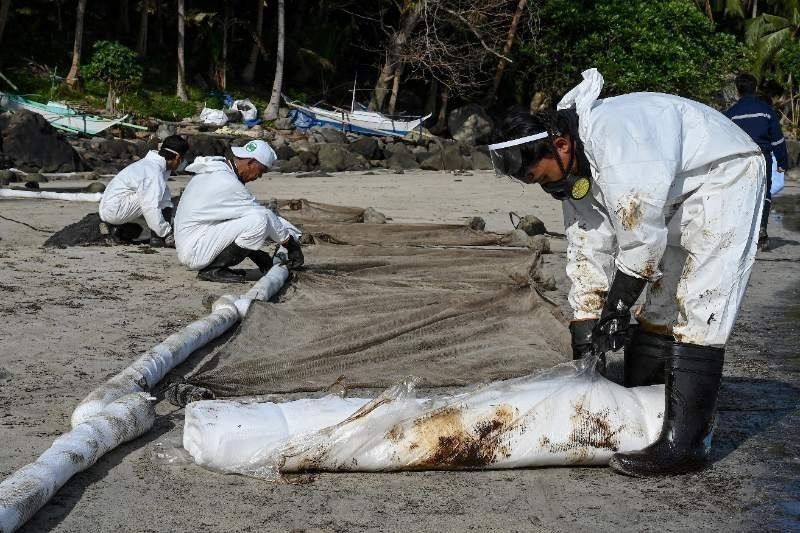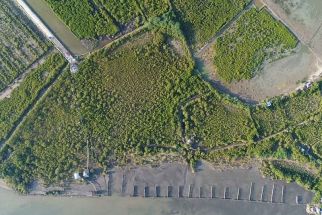'More talk, little action': Green groups call for stronger environmental, climate action ahead of Marcos' 2nd SONA

MANILA, Philippines — President Ferdinand “Bongbong” Marcos Jr. should immediately address the environmental and social impacts of the oil spill in Oriental Mindoro, halt destructive infrastructure projects, and prioritize a just transition to renewable energy in his remaining five years in office, environmentalists and climate campaigners said ahead of his second State of the Nation Address.
In his first SONA, Marcos stressed the need to switch to renewable energy, build disaster resilience, and properly enforce laws on the environment.
But green groups are holding back praise until Marcos turns his words on environmental protection and responses to climate change into action.
“In general, Marcos Jr.’s first year has featured a lot of talk, but little action in the right direction in terms of environment and climate issues,” Kalikasan People’s Network for the Environment national coordinator Jon Bonifacio told Philstar.com.
Oil spill
Nearly five months after MT Princess Empress sank off Oriental Mindoro and leaked oil into the sea, locals and environmentalists are still calling for a concrete plan for cleanup and rehabilitation, just compensation, accountability, and policy and legal reforms to protect the marine life-rich Verde Island Passage and prevent similar incidents in the future.
The oil spill—which has disrupted the lives of coastal folk, and damaged mangrove areas, seagrass beds and coral reefs—is the Marcos administration’s biggest environmental disaster to date.
In June, the Philippine Coast Guard said that all the oil leaked from the tanker had been fully extracted. The Oriental Mindoro provincial government announced last week the lifting of the fishing ban in Pola—the town that sustained the most damage from the oil spill.
But residents and advocates said these do not signal the end of the oil spill crisis.
“There is no victory for the administration to claim. The delivery of long overdue compensation at a proper valuation for oil spill victims has yet to be made. There is zero accountability from polluters like RDC Reield Marine Services, Inc. and San Miguel Corporation and irresponsible authorities that contributed to this crisis,” the Protect Verde Island Passage said in a statement.
“Even as talks of terminating the oil spill response are underway, a proposed comprehensive rehabilitation plan with corresponding budget has not been publicly discussed,” it added.
The Department of Environment and Natural Resources earlier called for the declaration of the VIP as a legislated protected area. The agency also said it will work with local shipowners to prevent a repeat of the oil spill.
Extractive, destructive activities
Early this year, residents of Sibuyan Island in Romblon thwarted the mining exploration activities of Altai Philippines Mining Corp., fearing the extraction of nickel ore will damage the island—dubbed as the “Galápagos of Asia”—and affect the livelihoods of locals.
Residents of Brooke’s Point in Palawan, who were inspired by the victory of Sibuyanons, also set up a barricade to stop the operations of Ipilan Nickel Corp.
They have been asking the environment department to cancel the mineral production sharing agreements of the two firms.
Revitalizing the mining sector is a priority of the Marcos administration. The Philippines is the fifth most mineral-rich country in the world, producing minerals such as gold, chromium, cobalt, copper, nickel and silver.
Green groups also called for a comprehensive review of seabed quarrying and offshore mining activities, which force fishers in Cavite province to venture farther out and drive away fish due to pollution and force. According to anti-mining coalition Alyansa Tigil Mina, there are 11 large-scale offshore mining projects all over the country.
“In the midst of a climate emergency, the continued destruction of nature through mining and other extractive activities is simply unacceptable,” ATM said.
Environmental organizations also continued to call for a halt to reclamation projects, which are seen to destroy coastal habitats, affect fishers’ livelihood and expose coastal communities to floods.
According to groups under People’s Network for the Integrity of Coastal Habitats and Ecosystem, there are around 50 reclamation projects across the country, which will potentially affect 27,000 hectares of coastal and marine resources.
Climate action?
Aksyon Klima Pilipinas said that while Marcos highlighted the climate crisis as one of his main priorities, it stressed the “overarching strategy for climate action is still incoherent, insufficient, and incompatible with what is required for the Philippines to achieve both its climate and development goals.”
Greenpeace renewed its call to the government to wean off its dependence on fossil fuels, and aim for more ambition toward a just transition to 100% renewable energy.
“This also entails that the government strike out unnecessary detours from this transition, such as dangerous and costly nuclear energy, as well as natural gas, which is also a fossil fuel,” it said.
Marcos is pushing for the adoption of nuclear power and the development of fossil gas.
The Philippines is targeting to boost renewables in its current energy mix, which it hopes will hit 35% share by 2030 and 50% by 2040. In 2020, only 21% of the country’s generated power came from renewables such as solar, wind, hydropower, and geothermal.
Aksyon Klima Pilipinas called on the Philippines to commit to a net-zero emissions target by 2050, finalize the policy documents for adaptation and resilience-building, reduce plastic production and single-use plastic, and make the People’s Survival Fund more readily accessible to the most vulnerable municipalities to implement their adaptation projects.
“The reality remains that the Philippine government’s performance for addressing the climate crisis is still not enough,” it said.
- Latest


























